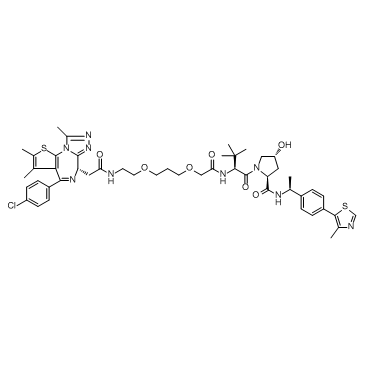| Description |
ARV-771 is a potent bromodomain and extra-terminal (BET) proteins degrader based on PROTAC technology with Kd values of 4.7, 7.6, 7.6 nM against BRD2, BRD3 and BRD4, respectively.
|
| Related Catalog |
|
| Target |
Kd: 4.7 nM (BRD2), 7.6 nM (BRD3), 7.6 nM (BRD4)[1] IC50: <1 nM (c-MYC protein)[1]
|
| In Vitro |
ARV-771, a small-molecule pan-BET degrader based on proteolysis-targeting chimera (PROTAC) technology, demonstrates dramatically improved efficacy in cellular models of CRPC as compared with BET inhibition. ARV-771 potently degrades BRD2/3/4 in 22Rv1 cells with a DC50 less than 5 nM. c-MYC protein is a downstream effector of BET proteins. Treatment with ARV-771 results in depletion of c-MYC with an IC50 of less than 1 nM. ARV-771 shows strong antiproliferative effect on 22Rv1, VCaP, and LnCaP95 cell lines. ARV-771 treatment has a pronounced effect on cell morphology consistent with apoptosis. FL-AR and AR-V7 mRNA are down-regulated upon treatment with 10 nM ARV-771 in VCaP cells. ARV-771 has an antiandrogenic effect on a number of AR-regulated genes in VCaP cells[1].
|
| In Vivo |
Treatment of non castrated male Nu/Nu mice bearing AR-V7+ 22Rv1 tumor xenografts with daily subcutaneous injections of ARV-771 at 10 mg/kg for 3 d results in 37% and 76% down-regulation of BRD4 and c-MYC levels, respectively, in tumor tissue. A marked down-regulation in levels of AR-V7 is observed in the 22Rv1 tumors after ARV-771 treatment[1].
|
| Cell Assay |
ARV-771 is dissolved in DMSO. 22Rv1 cells (5,000 cells per well) are dosed with ARV-771 serially diluted 1:3 for a 10-point dose curve for 72 h. CellTiter-Glo Luminescent Cell Viability Assay is added, and the plate is read on a luminometer. Data are analyzed and plotted using GraphPad Prism software[1].
|
| Animal Admin |
Mice: Mice bearing tumors are treated with ARV-771 (5, 10, 30, 50 mg/kg) for up to 3 wk, depending on the experiment. Mice are sacrificed 8 h after the final dose. Plasma and tissues are harvested and flash frozen for further analysis[1].
|
| References |
[1]. Raina K, et al. PROTAC-induced BET protein degradation as a therapy for castration-resistant prostate cancer. Proc Natl Acad Sci U S A. 2016 Jun 28;113(26):7124-9.
|
